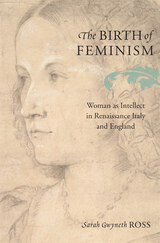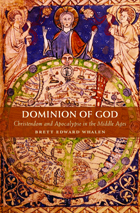
In this illuminating work, surveying 300 years and two nations, Sarah Gwyneth Ross demonstrates how the expanding ranks of learned women in the Renaissance era presented the first significant challenge to the traditional definition of “woman” in the West.
An experiment in collective biography and intellectual history, The Birth of Feminism focuses on nineteen learned women from the middle ranks of society who rose to prominence in the world of Italian and English letters between 1400 and 1680. Drawing both on archival material—wills, letters, and manuscript compositions, some presented here for the first time—and on printed writings, Ross gives us an unprecedented sense of educated early modern women’s lives.
Sponsored and often educated by their learned fathers and other male relatives within a model that Ross terms “the intellectual family,” female authors publicized their works within the safety of family networks. These women, including Christine de Pizan, Laura Cereta, Margaret More Roper, Lucrezia Marinella, and Bathsua Makin, did not argue for women’s political equality, but they represented and often advocated women’s intellectual equality. Ross demonstrates that because of their education, these women had a renaissance during the Renaissance, and that in so doing they laid the foundation for the emancipation of womankind.

Brett Whalen explores the compelling belief that Christendom would spread to every corner of the earth before the end of time. During the High Middle Ages—an era of crusade, mission, and European expansion—the Western followers of Rome imagined the future conversion of Jews, Muslims, pagans, and Eastern Christians into one fold of God’s people, assembled under the authority of the Roman Church.
Starting with the eleventh-century papal reform, Whalen shows how theological readings of history, prophecies, and apocalyptic scenarios enabled medieval churchmen to project the authority of Rome over the world. Looking to Byzantium, the Islamic world, and beyond, Western Christians claimed their special place in the divine plan for salvation, whether they were battling for Jerusalem or preaching to unbelievers. For those who knew how to read the signs, history pointed toward the triumph and spread of Roman Christianity.
Yet this dream of Christendom raised troublesome questions about the problem of sin within the body of the faithful. By the late thirteenth and fourteenth centuries, radical apocalyptic thinkers numbered among the papacy’s most outspoken critics, who associated present-day ecclesiastical institutions with the evil of Antichrist—a subversive reading of the future. For such critics, the conversion of the world would happen only after the purgation of the Roman Church and a time of suffering for the true followers of God.
This engaging and beautifully written book offers an important window onto Western religious views in the past that continue to haunt modern times.
READERS
Browse our collection.
PUBLISHERS
See BiblioVault's publisher services.
STUDENT SERVICES
Files for college accessibility offices.
UChicago Accessibility Resources
home | accessibility | search | about | contact us
BiblioVault ® 2001 - 2024
The University of Chicago Press









